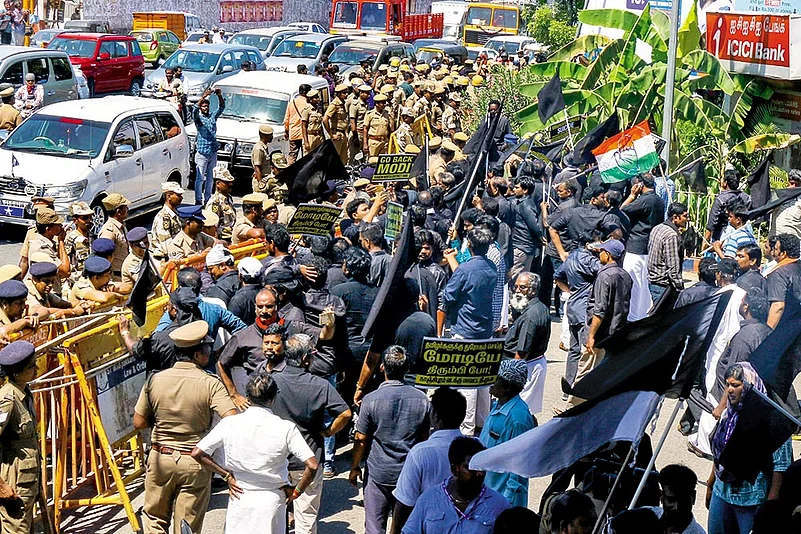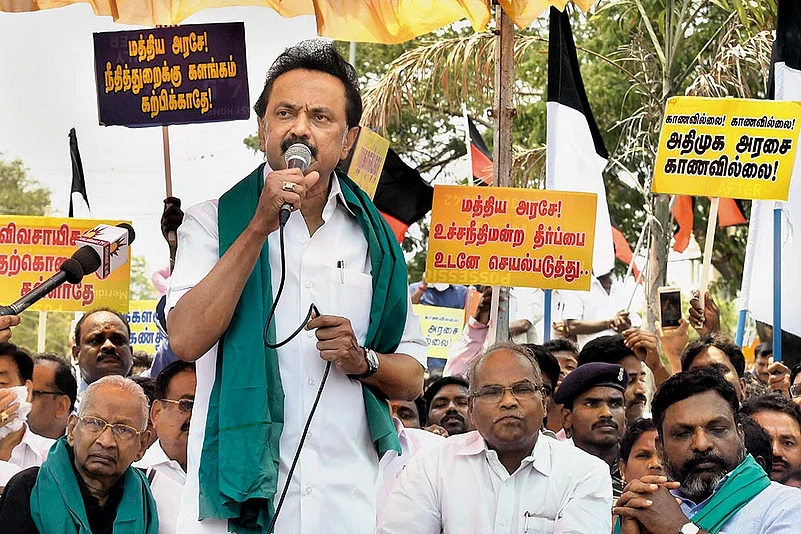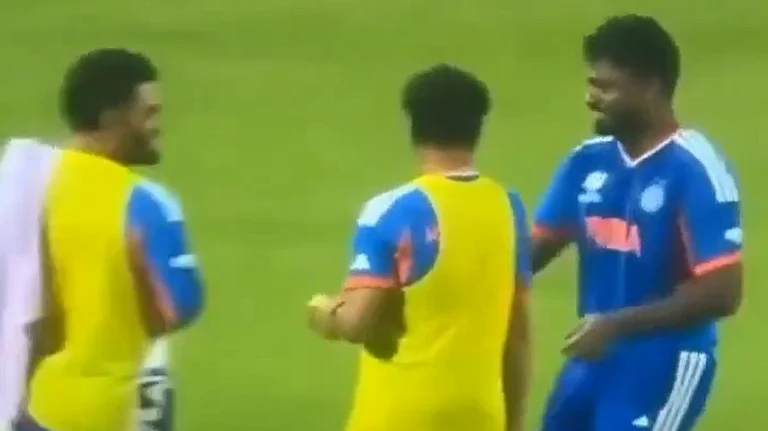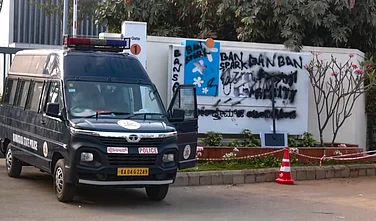M.K. Stalin was a tired man after trudging through the Cauvery delta for almost a week for what he said was a bid to retrieve the river. The 65-year-old DMK leader, who is considered to be among the fitter of the regional leaders of Tamil Nadu, kept ducking into the air-conditioned tempo traveller after walking a few hundred meters under an unkind sun.
The self-inflicted ordeal was part of a crafty political calculation DMK patriarch M. Karunanidhi’s son had come up in the face of a criticism: that he’s not sufficiently savvy to exploit the troubles of the ruling AIADMK. “Stalin needed to send out his own political message to prove that he has come out of his father’s shadow and also enthuse DMK cadres with a road show that had an emotive appeal,” explains DMK spokesperson K.S. Radhakrishnan. “The Centre played into his hands by delaying the Cauvery Management Board—and Stalin lunged at it and proved his political mettle.” The Cauvery outreach eventually proved to be a bigger success than anticipated, with farmers lining up en route to greet Stalin.
The DMK working president could have remained satisfied with the April 5 bandh demanding the immediate formation of a Cauvery Management Board. That protest had seen the state grind to a halt—and the DMK could claim credit for bringing together the Opposition and farmers’ outfits in organising the bandh. But the DMK scion needed to keep the Cauvery pot boiling as long as it was possible. “One main reason is guilt,” reasons political commentator Raveenthran Duraisamy. “Because Cauvery became a dispute in 1974 when the DMK was ruling and Karunanidhi was the chief minister. History shows that Tamil Nadu’s claim got compromised at this stage. So Stalin had to atone for his father’s mistake. He cleverly used the present crisis to emerge as the saviour of Cauvery and farmers.”
Stalin also had an electoral reason to hit the road: to improve the DMK’s electoral prospects in the delta that used to be its stronghold before AIADMK supremo J. Jayalalitha made inroads into this fertile belt in east-central Tamil Nadu. To illustrate, in the 2016 assembly elections the DMK won only 19 assembly seats compared to the AIADMK’s 29 in the eight districts of the delta. That time, the DMK could not play the Cauvery card in the delta districts, as people saw Jayalalitha as the protagonist in getting the tribunal’s final award notified in the central gazette after a prolonged legal battle. So the present context was an ideal opportunity to shore up the DMK’s popular base here.
Stalin also realised that Cauvery was a great leveller—especially when the delta is thirsty—and parties would find it difficult to resist its political appeal. So, along with the Congress, he grafted the CPI and CPI(M)—besides a few smaller parties—into his journey, hoping that this would crystalise into a firm political front for the coming elections. The CPI has anyway lost its following among the farmhands in the delta, while the CPI(M)’s clout has thinned to the industrial labour around Tiruchi. So both Communist parties readily jumped onto Stalin’s bandwagon, hoping to revive their traditional roots.

Tamil outfits protest against the PM’s April 12 Chennai visit
Stalin, while terming the Centre and the BJP as the villain in the Cauvery denouement, conveniently hid from public view that it’s not the saffron party that administers the only two states opposing the formation of the CMB. Karnataka has a Congress regime, while a Left alliance rules Kerala. “This crucial fact has been drowned in all the din the DMK has managed to whip up,” notes BJP spokesperson K.T. Raghavan.
By staking his political future on the week-long tour, Stalin had hoped to dictate the political discourse on Cauvery. Unfortunately for him, a bunch of fringe parties spoilt his trip by targeting an IPL match at Chennai on April 10 and converting it into a prestige battle. Led by the call given by T. Velmurugan who heads a fringe party called TVK, other groups latched on, questioning the logic in Chennai hosting cricket matches when a fight for the CMB was being waged across the state. So the city witnessed cadres of VCK, actor-director Seeman’s Naam Thamizhar Katchi and even filmmakers battling police cordons to lay siege to the Chepauk stadium, notwithstanding the fact that over 20,000 fans had turned up at the match between CSK and KKR.
While Stalin wanted to make a political statement on Cauvery, these fringe groups merely sought to prove their nuisance value by demonstrating their capacity to disrupt the tournament. The IPL’s decision to move out all future matches from Chennai proved that their blackmail had worked. But Velmurugan argues that the IPL matches were wrongly timed. “When the Telangana agitation was in full flow, the IPL matches were moved out of Andhra Pradesh (in 2010). Moreover, IPL is mere gambling with official sanction,” he adds.
Such hit-and-run tactics of the fringe parties, though, cannot be equated with that of political parties, argue mainstream politicians. “The fringe groups need one protest after another to keep their cadres engaged and hog the headlines. They behave like guerrilla groups indulging in urban warfare,” says former DMK minister Thangam Thennarasu. “But a political party like ours, with a long history, cannot behave similarly. That is the reason our leader distanced himself from the protests against the IPL since the focus on Cauvery should not be diluted.”
The fringe also stood exposed as Seeman had to disown some of his own cadres after they were shown assaulting uniformed cops. It led actor Rajnikanth to call for stricter laws to punish those attacking men in khaki. “Once the police arrested more than two dozen of his followers, Seeman quickly backed down,” points out political observer S.J. Idhaya. “It proved that fringe groups survive more on publicity and cannot survive a police crackdown, unlike the case with cadre-based political parties. Most of them have no second-line leadership to sustain the fight if the leader gets jailed.”
While the fringe might celebrate the IPL shifting base, what it has failed to notice is the bad name such protests have brought to Tamil Nadu, particularly its capital. “Chennai would not be viewed as a preferred choice for international tournaments after the IPL fiasco,” says Congress leader Karate Thiagarajan, who also heads the Karate Association of India. “After all the preparations that go into a tournament, a fringe leader’s whim disrupts a match at the last minute! This is hardly the right advertisement for a vibrant and economically active city.”
The April 10 protests were followed by black-flag demonstrations against Prime Minister Narendra Modi’s visit to Chennai two days later, when he came for the Defence Expo. That once again disrupted life across the metropolis. But the BJP countered it by saying that while a few hundred cadres turned up for the protests, tens of thousand people lined up to visit the expo and toured the warships anchored. “These are the real Tamils and Indians,” gushes BJP spokesman Thirupathi Narayanan. “Obviously, they outnumbered those shouting slogans. It only proves that a silent majority will always have the last say against the vocal minority.”
There remains the larger question: will the Cauvery dispute get resolved with the mere formation of the CMB? If and when the board is formed, there could be a second round to the battle. Then things might shift to Karnataka, where its opponents are lying in wait.


























